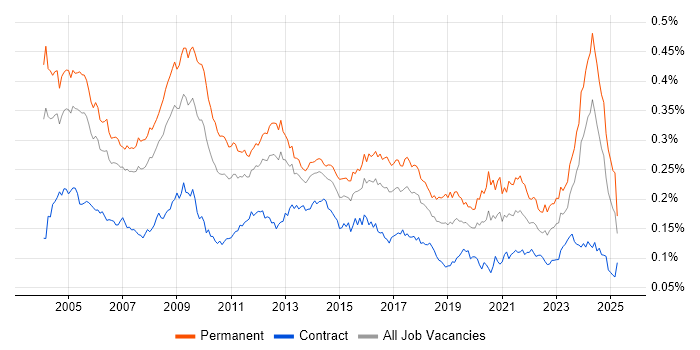System Manager
UK
The median System Manager salary in the UK is £60,000 per year, according to job vacancies posted during the 6 months leading to 1 May 2025.
The table below provides salary benchmarking and summary statistics, comparing them to the same period in the previous two years.
| 6 months to 1 May 2025 |
Same period 2024 | Same period 2023 | |
|---|---|---|---|
| Rank | 585 | 507 | 785 |
| Rank change year-on-year | -78 | +278 | +107 |
| Permanent jobs requiring a Systems Manager | 107 | 432 | 204 |
| As % of all permanent jobs advertised in the UK | 0.21% | 0.44% | 0.20% |
| As % of the Job Titles category | 0.23% | 0.46% | 0.21% |
| Number of salaries quoted | 68 | 350 | 126 |
| 10th Percentile | £42,500 | £35,000 | £44,562 |
| 25th Percentile | £50,000 | £45,000 | £47,500 |
| Median annual salary (50th Percentile) | £60,000 | £52,000 | £56,650 |
| Median % change year-on-year | +15.38% | -8.21% | -5.58% |
| 75th Percentile | £68,750 | £63,750 | £68,438 |
| 90th Percentile | £73,750 | £72,050 | £80,625 |
| UK excluding London median annual salary | £57,500 | £50,000 | £59,250 |
| % change year-on-year | +15.00% | -15.61% | +4.90% |
All Permanent IT Job Vacancies
UK
For comparison with the information above, the following table provides summary statistics for all permanent IT job vacancies. Most job vacancies include a discernible job title that can be normalized. As such, the figures in the second row provide an indication of the number of permanent jobs in our overall sample.
| Permanent vacancies in the UK with a recognized job title | 46,902 | 93,183 | 95,132 |
| % of permanent jobs with a recognized job title | 90.12% | 94.62% | 91.53% |
| Number of salaries quoted | 27,275 | 66,883 | 59,840 |
| 10th Percentile | £30,000 | £28,500 | £32,500 |
| 25th Percentile | £42,000 | £38,500 | £45,000 |
| Median annual salary (50th Percentile) | £57,500 | £52,777 | £60,000 |
| Median % change year-on-year | +8.95% | -12.04% | - |
| 75th Percentile | £75,000 | £71,250 | £81,250 |
| 90th Percentile | £97,500 | £90,000 | £100,000 |
| UK excluding London median annual salary | £52,000 | £50,000 | £52,500 |
| % change year-on-year | +4.00% | -4.76% | +5.00% |
Systems Manager
Job Vacancy Trend
Job postings that featured Systems Manager in the job title as a proportion of all IT jobs advertised.

Systems Manager
Salary Trend
3-month moving average salary quoted in jobs citing Systems Manager.
Systems Manager
Salary Histogram
Salary distribution for jobs citing Systems Manager over the 6 months to 1 May 2025.
Systems Manager
Top 15 Job Locations
The table below looks at the demand and provides a guide to the median salaries quoted in IT jobs citing Systems Manager within the UK over the 6 months to 1 May 2025. The 'Rank Change' column provides an indication of the change in demand within each location based on the same 6 month period last year.
| Location | Rank Change on Same Period Last Year |
Matching Permanent IT Job Ads |
Median Salary Past 6 Months |
Median Salary % Change on Same Period Last Year |
Live Jobs |
|---|---|---|---|---|---|
| England | -95 | 91 | £59,756 | +13.82% | 168 |
| UK excluding London | -54 | 54 | £57,500 | +15.00% | 148 |
| Work from Home | +109 | 37 | £62,500 | +1.63% | 43 |
| London | +65 | 33 | £62,500 | +4.17% | 43 |
| Midlands | +45 | 17 | £57,500 | +27.78% | 24 |
| South East | +37 | 14 | £45,000 | -10.00% | 52 |
| West Midlands | +35 | 14 | £57,500 | +21.05% | 12 |
| East of England | +28 | 10 | £60,000 | +10.09% | 18 |
| North of England | -21 | 9 | £50,000 | - | 29 |
| North West | -37 | 6 | £47,160 | -5.68% | 18 |
| South West | +81 | 3 | - | - | 12 |
| Yorkshire | +43 | 2 | £73,750 | +47.50% | 9 |
| East Midlands | +27 | 2 | £47,500 | +11.76% | 10 |
| Scotland | +126 | 1 | £75,000 | +50.00% | 8 |
| Wales | +45 | 1 | £50,000 | +2.04% | 3 |
Systems Manager Skill Set
Top 30 Co-occurring Skills and Capabilities
For the 6 months to 1 May 2025, Systems Manager job roles required the following skills and capabilities in order of popularity. The figures indicate the absolute number co-occurrences and as a proportion of all permanent job ads featuring Systems Manager in the job title.
|
|
Systems Manager Skill Set
Co-occurring Skills and Capabilities by Category
The follow tables expand on the table above by listing co-occurrences grouped by category. The same employment type, locality and period is covered with up to 20 co-occurrences shown in each of the following categories:
|
|
|||||||||||||||||||||||||||||||||||||||||||||||||||||||||||||||||||||||||||||||||
|
|
|||||||||||||||||||||||||||||||||||||||||||||||||||||||||||||||||||||||||||||||||
|
|
|||||||||||||||||||||||||||||||||||||||||||||||||||||||||||||||||||||||||||||||||
|
|
|||||||||||||||||||||||||||||||||||||||||||||||||||||||||||||||||||||||||||||||||
|
|
|||||||||||||||||||||||||||||||||||||||||||||||||||||||||||||||||||||||||||||||||
|
|
|||||||||||||||||||||||||||||||||||||||||||||||||||||||||||||||||||||||||||||||||
|
|
|||||||||||||||||||||||||||||||||||||||||||||||||||||||||||||||||||||||||||||||||
|
|
|||||||||||||||||||||||||||||||||||||||||||||||||||||||||||||||||||||||||||||||||
|
|
|||||||||||||||||||||||||||||||||||||||||||||||||||||||||||||||||||||||||||||||||
